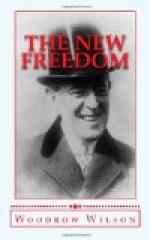Where I got into trouble was, that I ventured on a comparison. I said that public opinion was not typified on the streets of a busy city, but was typified around the stove in a country store where men sat and probably chewed tobacco and spat into a sawdust box, and made up, before they got through, what was the neighborhood opinion both about persons and events; and then, inadvertently, I added this philosophical reflection, that, whatever might be said against the chewing of tobacco, this at least could be said for it: that it gave a man time to think between sentences. Ever since then I have been represented, particularly in the advertisements of tobacco firms, as in favor of the use of chewing tobacco!
The reason that some city men are not more catholic in their ideas is that they do not share the opinion of the country, and the reason that some countrymen are rustic is that they do not know the opinion of the city; they are both hampered by their limitations. I heard the other day of a woman who had lived all her life in a city and in an hotel. She made a first visit to the country last summer, and spent a week in a farmhouse. Asked afterward what had interested her most about her experience, she replied that it was hearing the farmer “page his cows!”
A very urban point of view with regard to a common rustic occurrence, and yet that language showed the sharp, the inelastic limits of her thought. She was provincial in the extreme; she thought even more narrowly than in the terms of a city; she thought in the terms of an hotel. In proportion as we are confined within the walls of one hostelry or one city or one state, we are provincial. We can do nothing more to advance our country’s welfare than to bring the various communities within the counsels of the nation. The real difficulty of our nation has been that not enough of us realized that the matters we discussed were matters of common concern. We have talked as if we had to serve now this part of the country and again that part, now this interest and again that interest; as if all interests were not linked together, provided we understood them and knew how they were related to one another.
If you would know what makes the great river as it nears the sea, you must travel up the stream. You must go up into the hills and back into the forests and see the little rivulets, the little streams, all gathering in hidden places to swell the great body of water in the channel. And so with the making of public opinion: Back in the country, on the farms, in the shops, in the hamlets, in the homes of cities, in the schoolhouses, where men get together and are frank and true with one another, there come trickling down the streams which are to make the mighty force of the river, the river which is to drive all the enterprises of human life as it sweeps on into the great common sea of humanity.




